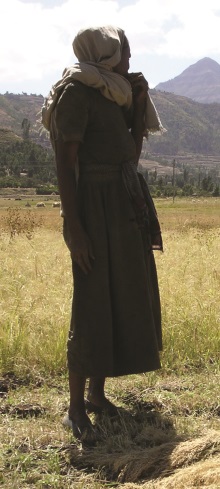Eleven years ago, I was offered a job with the Record. With it came a trip to Ethiopia—my first foray to the developing world, and an eye – opening, inspiring, transforming experience.
I travelled with the Canadian Foodgrains Bank—a Christian organization comprised of 15 Canadian church partners (including the Presbyterian Church), dreaming and toiling towards a world without hunger. The trip in 2003 marked the 20th anniversary of Ethiopia’s absolutely devastating famine. One million people lost their lives. Amidst the dust and doom, it was the newly – minted CFGB that was bringing grain to starving families.
And so a wonderful story of hope began.
 “This vision of society under the rule of God where there shall be no poor among us, where the hungry shall be fed, shaped the establishment of the Canadian Foodgrains Bank,” said executive director, Jim Cornelius.
“This vision of society under the rule of God where there shall be no poor among us, where the hungry shall be fed, shaped the establishment of the Canadian Foodgrains Bank,” said executive director, Jim Cornelius.
“Any reading of the scriptures makes it clear that in the Kingdom of God … we all have been given responsibility to ensure that those in need, those who are hungry, are cared for and have food.”
This dedication and expertise amidst a world of pain and suffering led to CFGB being named this year’s E.H. Johnson award recipient for being “on the cutting edge of mission.” The honour is bestowed annually at a special General Assembly luncheon.
“The gravity of ignoring the hungry, the poor, the disposed, is repeatedly emphasized in the biblical texts,” continued Cornelius in his address. “It is not just something that would be good to do, if you are able, if you have time, if you have some spare funds. It is a requirement, an obligation. In the Gospel of Matthew (25:31 – 46), Jesus provides an account of the final judgment where people are divided on the basis of whether they have fed the hungry, clothed the naked, and welcomed the stranger.”
Since its founding 30 years ago, the Foodgrains Bank has provided over 1.1 million tonnes of food and seeds to people in 78 countries. In addition to food assistance, they help improve food security and nutrition, and, here in Canada, influence public policy related to ending hunger.
In Ethiopia, I saw several villages that were once dry and barren, their people poor and hopeless, but after being taught how to build water cisterns and irrigation systems (built with local labour through food – for – work programs), the land was transformed to lush and fertile. Men now had work. Families now had food. And people could keep their land. I saw smiles and laughter; I saw people proud to show the results of their labour; and yes, I saw that there is still a long way to go. Once called the breadbasket of the world, CFGB is helping to restore Ethiopia (and others) to its former glory.
As explained by Cornelius: “The MCC Food Bank was started by the Mennonites in the mid – 1970s. They were troubled by … how national and global systems were operating in ways that were not addressing the urgent needs of ‘the least of these.’ They imagined a food bank that would model a different way of working.” In 1982, the Mennonite Central Committee sought interest in establishing an inter – church food bank, and the Canadian Foodgrains Bank was born one year later. The Presbyterian Church through Presbyterian World Service & Development joined in 1992.
During the award luncheon, Ken Kim, director of PWS&D, asked those in the room who had supported the bank in any way to stand up. About a quarter of the room did so. Some were farmers who planted crops to grow, sell and donate the proceeds; some were part of urban congregations who partnered with one of 200 community growing projects; some had organized fundraising events; and still others were individuals who simply donated regularly.
“One of the images of the Kingdom of God is of a banquet table to which all are invited,” said Cornelius. “By taking practical action to feed those who are hungry, to support efforts that improve nutrition and restore and strengthen livelihoods, the church becomes a community of promise for the wider world.
“Jesus calls us to participate in his redemptive and healing work,” he continued, “to be a sign, a foretaste, and an agent of the in – breaking reign of God where hunger is
no more.”
Enquiries about subscriptions
Since the closing of the Presbyterian Record, people with questions about payments and their subscriptions should contact Jason Leung at The Presbyterian Church in Canada national office by email tojleung@presbyterian.ca
or call 1-800-619-7301 ext. 312
The Presbyterian Record ceased publication in December 2016
